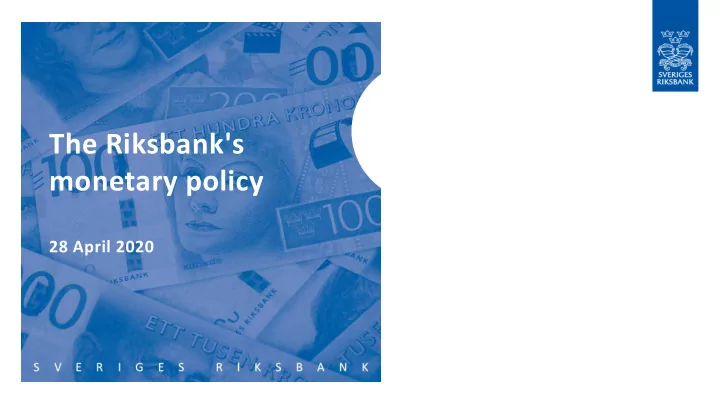

The Riksbank's monetary policy 28 April 2020
Global synchronised crisis Measures to dampen the spread of the coronavirus have severely slowed down activity in the global economy • Restrictions and uncertainty over how long the restrictions will last • Both production and demand are falling • The entire world is affected simultaneously
The crisis will worsen if the financial markets do not function • Uncertainty over the crisis has led to substantial fluctuations on the financial markets • More difficult and more expensive to obtain funding on financial markets • Credit tightening risks exacerbating the crisis
Extensive measures to hold down interest rates and facilitate the credit supply The banks can borrow from Purchases of government, Increased access Loans in the Riksbank for onward lending mortgage, municipal and and to safe and liquid assets US dollars to companies commercial paper SEK 500 billion SEK 300 billion Unlimited USD 60 billion
The rise in interest rates has slowed down 2 2 Government bond Mortgage bond Covered bond Municipal bond 1 1 0 0 -1 -1 Jan-18 Jul-18 Jan-19 Jul-19 Jan-20 Jul-20 Yields on 5-year bonds, per cent Sources: Macrobond and the Riksbank
Deep and rapid decline in Swedish economy Clear signs on the labour market Severe slowdown in the economy 15 15 0 0 -15 -15 -30 -30 -45 -45 -60 -60 -75 -75 Daily turnover in the resturant industry -90 -90 Annual percentage change (daily data) and number per month Sources: Caspeco, Swedish Public Employment Service, Statistics Sweden and the Riksbank
Falling energy prices will contribute to low inflation this year Annual percentage change and percentage points The contribution of energy prices Sources: Statistics Sweden and the Riksbank to the CPIF in the forecast is calculated as the annual percentage change in energy prices multiplied by their current weight in the CPIF.
The crisis can affect inflation in different ways 5.0 30 2.5 15 • Inflation statistics particularly uncertain now 0.0 0 • Disruptions to production and deliveries can lead to unexpected price movements in the short term -2.5 -15 Internet prices on fruit and vegetables (left scale) • Demand lower, but also supply Price on gasoline (right scale) -5.0 -30 17 18 19 20 Annual percentage change. Internet data refers to Sources: Macrobond and prices of fruit and vegetables that can be bough online the Riksbank and is average of daily price observations up until 21 April. Price on gasoline is average of daily price observations up until 27 April.
Exceedingly uncertain situation Economic developments depend on a number of factors that are genuinely uncertain • How long will society be limited by measures to dampen the spread of the virus? • How will households and companies act? • How are the spread and recovery doing abroad?
Major uncertainty regarding how deep and prolonged the economic decline will be Large fall in Swedish GDP this year Rapidly deteriorated labour market 12 12 110 110 GDP Scenario A Unemployment Scenario A GDP Scenario B 11 11 Unemployment Scenario B GDP MPR February 100 100 Unemployment MPR February 10 10 9 9 90 90 8 8 7 7 80 80 6 6 70 70 5 5 06 09 12 15 18 21 06 09 12 15 18 21 Index 2019 Q1=100 and percentage of labour force Sources: Statistics Sweden and the Riksbank
Low interest rates and extensive liquidity support the Swedish economy Low repo rate Sharp increase in balance sheet 3000 3000 2500 2500 2000 2000 1500 1500 1000 1000 500 500 0 0 08 10 12 14 16 18 20 Later this year with maximum use SEK billion and per cent respectively Source: The Riksbank
Important interaction between different policy areas Unprecedented economic policy measures to alleviate the consequences of the pandemic • Fiscal policy gives targeted support to households and companies • Monetary policy facilitates the credit supply in the economy • Measures by FI and SNDO increase the banks’ possibilities to grant loans The Riksbank is ready to do more if and when necessary
Recommend
More recommend